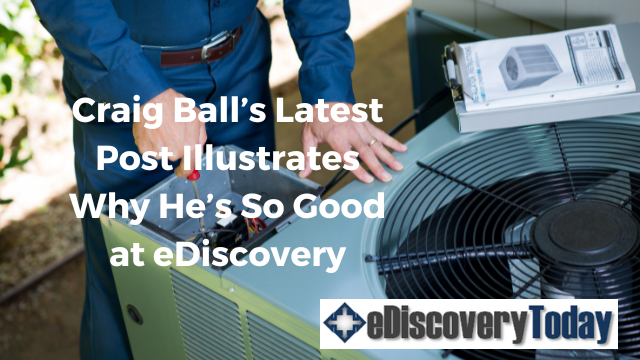
Craig Ball’s latest blog post on his excellent Ball in Your Court blog really blows. That’s not a statement about the quality of his post, it’s a statement about the topic of his post.
His latest post (Understanding Air Conditioning…For When You Really Need to Keep Your Cool) is – as the title indicates – about air conditioning.

You’re probably thinking it’s a post that compares air conditioning to eDiscovery, right?
Nope. It’s just about air conditioning – nothing else. I read through the entire post and it’s informatively, comprehensively, mind-numbingly about air conditioning. No mention of forensics or discovery anywhere, except to say he won’t be mentioning it.
That curious nature has enabled Craig to develop a tremendous level of knowledge in eDiscovery – enough to fill an entire Electronic Evidence Workbook that he uses to teach his E-Discovery and Digital Evidence course at the University of Texas Law School, UT Computer Science School and UT School of Information. And much more.
Doug Austin, eDiscovery Today
As Craig says in the opening sentence: “This post isn’t about forensics or e-discovery, but you can hardly be expected to focus on ESI if you’re sweltering in a hot house!”
Many of us can relate to the latter part of that sentence as it seems so many of us are experiencing record heat this summer. But I digress.
Craig also said two other things in the post that caught my eye:
- “Recently, I explained the mechanics of air conditioning to a curious friend”; and
- “I handle much of my own A/C maintenance and repair”.
Of course, he does! I’m sure Craig is probably a very handy guy.
I am most assuredly NOT a handy guy. Recently, I mounted a TV on the wall in our bedroom and it was an ordeal – even though it turned out OK, my wife Paige made me promise to hire a handyman if I ever plan to mount any more TVs. But that’s beside the point.
Craig’s two statements above illustrate to me two reasons why he’s so good at eDiscovery:
He’s always interested in how things work
Whether it’s forensics or metadata or other eDiscovery related topics, or even things like understanding UPC codes, how to create better PowerPoint presentations and how to your presence in Zoom meetings, Craig always seems to be learning. He will dive into and evaluate a product like Google Pinpoint probably first and foremost simply because he’s interested in how it works. Or develop an understanding of metadata in pictures, which became very important in this recent notable case.
That curious nature has enabled Craig to develop a tremendous level of knowledge in eDiscovery – enough to fill an entire Electronic Evidence Workbook that he uses to teach his E-Discovery and Digital Evidence course at the University of Texas Law School, UT Computer Science School and UT School of Information. And much more.
Craig’s not just interested in how things work, but also how they can be applied to law and eDiscovery. As a result, he is a leading consultant and Special Master in eDiscovery. I can’t think of anybody else who has the combination of legal and technology knowledge that Craig has.
He’s always interested in sharing his knowledge with others
The Electronic Evidence Workbook and the fact that he teaches a course at UT each year is only one illustration of that. Craig is always sharing his useful knowledge with the community. Recent examples include:
- A discussion of Slack Space, what it is and why should you care.
- A perfect exemplar preservation letter.
- The importance of using an eDiscovery “tool” instead of the native apps themselves to conduct review.
- What type of evidence is discoverable on mobile devices and level of difficulty of collecting it.
Those are just a few of many examples over the years. Craig can discuss Base2 encoding and Hash values with the same informative, mind-numbing detail that he discusses air conditioning. It’s enough to make your head explode!
Just kidding. Craig somehow manages to describe these complex topics in a manner that is digestible and understandable by his audience. I know I’ve learned a lot from reading his posts and his various other educational resources over the years.
BTW, Craig said I wouldn’t be covering his latest post, and I was inclined to agree with him until I thought about how his post reflects who he is and why he’s so good at eDiscovery. Take that, Craig! Craig’s desire to know how things work and his desire to share that knowledge with the rest of us has made us all better at eDiscovery.
Experience more of Doug Austin’s great work at the eDiscovery Today blog here.
Follow Doug Austin on JD Supra here.
Follow EDRM on JD Supra here.


